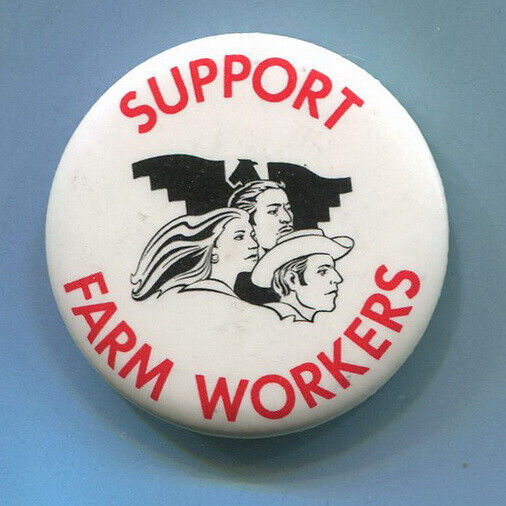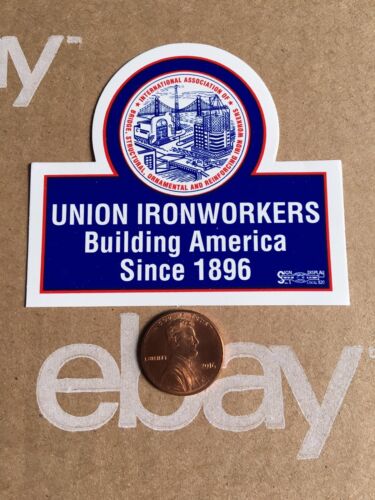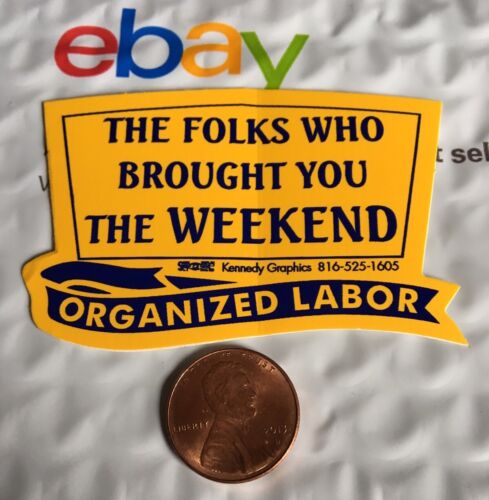-40%
Mid - Late 1960's UFW Support United Farm Workers Grape Boycott Cause Pin
$ 7.89
- Description
- Size Guide
Description
OFFERED FOR SALE IS THIS1 1/2 INCH CELLULOID PINBACK BUTTON
IN WHAT I BELIEVE TO BE REALLY GREAT SHAPE.
HOWEVER, THAT IS JUST MY OPINION.
SEE PHOTOS FOR CONDITION
, AND YOU BE THE JUDGE.
IF YOU HAVE ANY QUESTIONS, PLEASE CONTACT ME BEFORE BIDDING OR BUYING.
RETURNS ARE NOT ACCEPTED UNLESS THE ITEM IS NOT AS DESCRIBED OR SHOWN IN THE PHOTOS OR HAS SIGNIFICANT DAMAGE OR DEFECTS NOT VISIBLE IN THE PHOTOS OR OTHERWISE DESCRIBED.
GUARANTEED AUTHENTIC AND ORIGINAL AS DESCRIBED
.
Check out my other Political and Social Protest and Cause items listed on eBay
This pin was issued and sold in the mid to late 1960s to raise funds and support for the United Farm Workers efforts to organize migrant grape workers first in Delano and then throughout California, through strikes and consumer boycotts.
The pin has an image of the UFW Black Aztec Eagle and three farm workers and reads:
SUPPORT FARM WORKERS
B
RIEF HISTORY
OF THE UFW 1965 - 1975
The United Farm Workers of America (UFW) is a labor union founded by Philip Vera Cruz, Dolores Huerta, and Cesar Chavez. This union changed from a workers' rights organization that helped workers get unemployment insurance to that of a union of farmworkers almost overnight, when the National Farm Workers Association (NFWA) went out on strike in support of the mostly Filipino farmworkers of the Agricultural Workers Organizing Committee (AWOC) led by Larry Itliong in Delano, California who had previously initiated a grape strike on September 8, 1965.
The NFWA and the AWOC, recognizing their common goals and methods, and realizing the strengths of coalition formation, jointly formed the United Farm Workers Organizing Committee on August 22, 1966.
This organization eventually became the United Farm Workers and launched a boycott of table grapes that, after five years of struggle, finally won a contract with the major grape growers in California.
The union then brought in thousands more lettuce workers in the Salinas and Imperial Valleys and orange workers in Florida employed by subsidiaries of Coca-Cola.
The union publicly adopted the principles of non-violence championed by Mahatma Gandhi and Dr. Martin Luther King, Jr.
The union was poised to launch its next major campaign in the orange fields in 1973 when a deal between the International Brotherhood of Teamsters and the growers nearly destroyed it. The growers signed contracts giving the Teamsters the right to represent the workers who had been members of the UFW.
The UFW responded with strikes, lawsuits and boycotts, including secondary boycotts in the retail grocery industry. The union struggled to regain the members it had lost in the lettuce field; it never fully recovered its strength in grapes, due in some part to incompetent management of the hiring halls it had established that seemed to favor some workers over others.
The battles in the fields became violent, with a number of UFW members killed on the picket line. The violence led the state in 1975 to enact the California Agricultural Labor Relations Act, creating an administrative agency that oversaw secret ballot elections and binding arbitration for collective bargaining impasses.
This underground pinback button pin or badge relates to the Hippie (or Hippy ) Counterculture Movement of the psychedelic Sixties (1960s and Seventies (1970s). That movement included such themes and topics as peace, protest, civil rights, radical, socialist, communist, anarchist, union labor strikes, drugs, marijuana, pot, weed, lsd, acid, sds, iww, anti draft, anti war, anti rotc, welfare rights, poverty, equal rights, integration, gay, women's rights, black panthers, black power, left wing, liberal, etc. progressive political movement and is guaranteed to be genuine as described.
THIS IS MY HOBBY AND IS
NOT A BUSINESS
. THIS AND MY OTHER ITEMS ON EBAY ARE FROM MY PERSONAL COLLECTIONS AND WERE NOT INITIALLY ACQUIRED BY ME FOR RESALE. PROCEEDS GO TO BUY OTHER STUFF I AM INTERESTED IN COLLECTING.
I HAVE BEEN A LONG TIME MEMBER OF
A. P. I .C. (AMERICAN POLITICAL ITEMS COLLECTORS)
. IF YOU ARE NOT A MEMBER, YOU SHOULD CONSIDER JOINING.
IT IS A GREAT ORGANIZATION!
SHIPPING:
ITEMS WILL BE SAFELY PACKED TO AVOID DAMAGE DURING SHIPPING. ITEMS ARE SHIPPED BY
FIRST CLASS MAIL
.
SHIPPING TO DESTINATIONS
WITHIN THE UNITED STATES
IS
.50
OUTSIDE THE UNITED STATES
, SHIPPING IS
.00.
I WILL COMBINE SHIPPING CHARGES: JUST
WAIT TO PAY FOR ITEMS UNTIL I SEND AN INVOICE
WITH REDUCED SHIPPING CHARGES, OR REQUEST ONE. ONCE YOU PAY MULTIPLE SHIPPING CHARGES, I CANNOT REFUND THEM IN WHOLE OR IN PART.
SO PLEASE WAIT TO PAY.
THANK YOU FOR YOUR INTEREST.
The Deacons emerged as one of the first visible self-defense forces in the South and as such represented a new face of the
civil rights
movement. Traditional civil rights organizations remained silent on them or repudiated their activities. They were effective however in providing protection for local African Americans who sought to register to vote and for white and black civil rights workers in the area. The Deacons, for example, provided security for the 1966 March Against Fear from Memphis to Jackson,
Mississippi
. Moreover their presence in Southeastern Louisiana meant that the Klan would no longer be able to intimidate and terrorize local African Americans without challenge.
The strategy and methods that the Deacons employed attracted the attention and concern of the Federal Bureau of Investigation (FBI), which authorized an investigation into the group’s activities. The investigation stalled, however, when more influential black power organizations such as US and the
Black Panther Party
emerged after the
1965 Watts Riot
. With public attention, and the attention of the FBI focused elsewhere, the Deacons lost most of their notoriety and slowly declined in influence. By 1968 they were all but extinct. In 2003 the activities of the Deacons was the subject of a 2003, “Deacons for Defense.” - See more at: HTTPS://www.blackpast.org/aah/deacons-defense-and-justice#sthash.s6D3h3ZZ.dpuf
On July 10, 1964, a group of African American men in Jonesboro,
Louisiana
led by Earnest “Chilly Willy” Thomas and Frederick Douglas Kirkpatrick founded the group known as The Deacons for Defense and Justice to protect members of the
Congress of Racial Equality (CORE)
against Ku Klux Klan violence. Most of the “Deacons” were veterans of
World War II
and the
Korean War
. The Jonesboro chapter organized its first affiliate chapter in nearby Bogalusa, Louisiana led by Charles Sims, A.Z. Young and Robert Hicks. Eventually they organized a third chapter in Louisiana. The Deacons tense confrontation with the Klan in Bogalusa was crucial in forcing the federal government to intervene on behalf of the local African American community. The national attention they garnered also persuaded state and national officials to initiate efforts to neutralize the Klan in that area of the Deep South.
The Deacons emerged as one of the first visible self-defense forces in the South and as such represented a new face of the
civil rights
movement. Traditional civil rights organizations remained silent on them or repudiated their activities. They were effective however in providing protection for local African Americans who sought to register to vote and for white and black civil rights workers in the area. The Deacons, for example, provided security for the 1966 March Against Fear from Memphis to Jackson,
Mississippi
. Moreover their presence in Southeastern Louisiana meant that the Klan would no longer be able to intimidate and terrorize local African Americans without challenge.
The strategy and methods that the Deacons employed attracted the attention and concern of the Federal Bureau of Investigation (FBI), which authorized an investigation into the group’s activities. The investigation stalled, however, when more influential black power organizations such as US and the
Black Panther Party
emerged after the
1965 Watts Riot
. With public attention, and the attention of the FBI focused elsewhere, the Deacons lost most of their notoriety and slowly declined in influence. By 1968 they were all but extinct. In 2003 the activities of the Deacons was the subject of a 2003, “Deacons for Defense.” - See more at: HTTPS://www.blackpast.org/aah/deacons-defense-and-justice#sthash.s6D3h3ZZ.dpuf
On July 10, 1964, a group of African American men in Jonesboro,
Louisiana
led by Earnest “Chilly Willy” Thomas and Frederick Douglas Kirkpatrick founded the group known as The Deacons for Defense and Justice to protect members of the
Congress of Racial Equality (CORE)
against Ku Klux Klan violence. Most of the “Deacons” were veterans of
World War II
and the
Korean War
. The Jonesboro chapter organized its first affiliate chapter in nearby Bogalusa, Louisiana led by Charles Sims, A.Z. Young and Robert Hicks. Eventually they organized a third chapter in Louisiana. The Deacons tense confrontation with the Klan in Bogalusa was crucial in forcing the federal government to intervene on behalf of the local African American community. The national attention they garnered also persuaded state and national officials to initiate efforts to neutralize the Klan in that area of the Deep South.
The Deacons emerged as one of the first visible self-defense forces in the South and as such represented a new face of the
civil rights
movement. Traditional civil rights organizations remained silent on them or repudiated their activities. They were effective however in providing protection for local African Americans who sought to register to vote and for white and black civil rights workers in the area. The Deacons, for example, provided security for the 1966 March Against Fear from Memphis to Jackson,
Mississippi
. Moreover their presence in Southeastern Louisiana meant that the Klan would no longer be able to intimidate and terrorize local African Americans without challenge.
The strategy and methods that the Deacons employed attracted the attention and concern of the Federal Bureau of Investigation (FBI), which authorized an investigation into the group’s activities. The investigation stalled, however, when more influential black power organizations such as US and the
Black Panther Party
emerged after the
1965 Watts Riot
. With public attention, and the attention of the FBI focused elsewhere, the Deacons lost most of their notoriety and slowly declined in influence. By 1968 they were all but extinct. In 2003 the activities of the Deacons was the subject of a 2003, “Deacons for Defense.” - See more at: HTTPS://www.blackpast.org/aah/deacons-defense-and-justice#sthash.s6D3h3ZZ.dpuf
On July 10, 1964, a group of African American men in Jonesboro,
Louisiana
led by Earnest “Chilly Willy” Thomas and Frederick Douglas Kirkpatrick founded the group known as The Deacons for Defense and Justice to protect members of the
Congress of Racial Equality (CORE)
against Ku Klux Klan violence. Most of the “Deacons” were veterans of
World War II
and the
Korean War
. The Jonesboro chapter organized its first affiliate chapter in nearby Bogalusa, Louisiana led by Charles Sims, A.Z. Young and Robert Hicks. Eventually they organized a third chapter in Louisiana. The Deacons tense confrontation with the Klan in Bogalusa was crucial in forcing the federal government to intervene on behalf of the local African American community. The national attention they garnered also persuaded state and national officials to initiate efforts to neutralize the Klan in that area of the Deep South. - See more at: HTTPS://www.blackpast.org/aah/deacons-defense-and-justice#sthash.s6D3h3ZZ.dpuf










